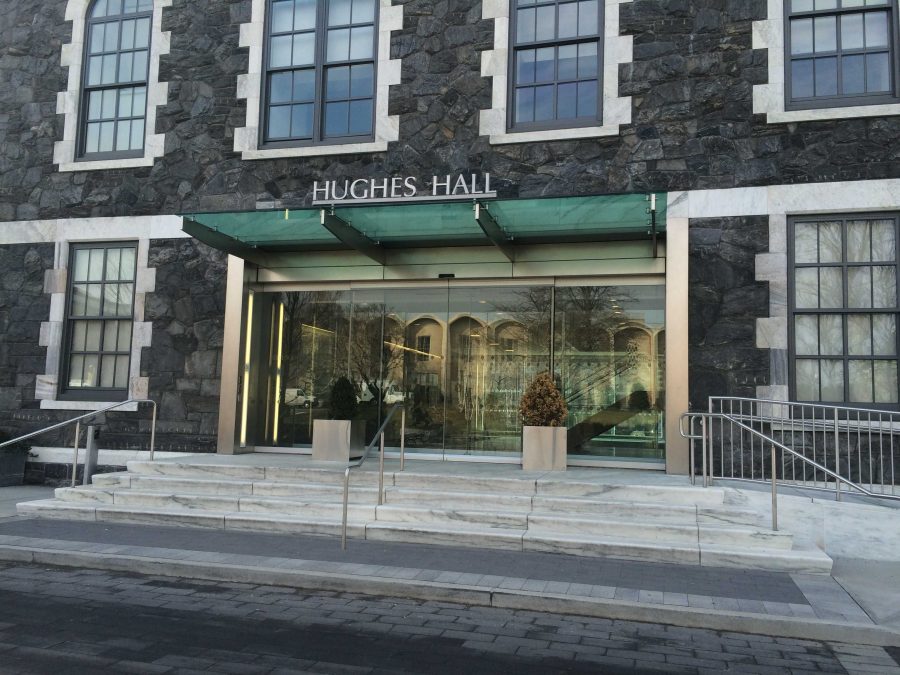By Kelly Kultys

Over the last few years Fordham has been attempting to meet the needs of its growing student population. With the help of the Excelsior campaign, the university added new residence halls at Rose Hill and Lincoln Center, a new home for the business school and the law school at Lincoln Center.
Still, according to Marco Valera, vice president of Facilities Operations, his department has a few smaller renovations to complete. Currently, the list includes improvements to the science labs, renovations to the church roofs, ADA-accessible additions and updates to the residence halls. The largest improvement on the list will be adding air conditioning units to Walsh Hall.
“We’re going to try this summer to replace all the windows — it’s going to be close,” Valera said. “And then after we have the windows in — it may not be this year maybe later in ‘15 or early in ‘16, we’ll be putting air conditioning in there.”
Walsh Hall is one of the few residential buildings on Fordham’s campus without air conditioning units.
However, one of the areas that was not specifically addressed is the crowded fitness facilities. This past summer, the university closed the Lombardi Fitness Center, which previously housed cardio and weightlifting equipment.
Nevin Kulangara, GSB ’15, and United Student Government executive president, called the current space “inadequate.”
“As versatile as [the RamFit Center] is, it just isn’t big enough, especially the free weights section,” Kulangara said. “I noticed as a student that it was almost dangerous working out in that free weights space. People were literally elbow to elbow trying to lift weights.”
Sarah Bickford, administrator of fitness and recreation in the RamFit Center, said it can be hard to judge how intensely the fitness facility is used because its usages varies with students’ schedules.

Still, she admitted there are times when the facility is noticeably more crowded. “Generally, the busiest times are 11 a.m. to 2 p.m. and around 3 to 4 p.m. on into the evening hours,” Bickford said in an email. “The less crowded times are: 6 a.m. to 11a.m. and 10 p.m. to 12a.m.”
Fordham Athletics is planning to open an auxiliary weight-lifting area near where the old Lombardi center was, but those plans were originally delayed until January.
Besides the fitness center however, one area that Kulangara and Valera have expressed interest in is making the campus more ADA-accessible.
“We’re adding ADA [compliant] entrance doors,” Valera said. “We have a program for multi-years primarily at Rose Hill. Next year we’ll probably add about five operating devices.”
Kulangara and USG, however, have been pushing for the renovation of Collins Hall for the addition of an elevator.
“We’re talking about basically the only facility on campus where groups like Mimes and Mummers can really perform using a full set of props and everything like that,” Kulangara explained. “At the same time, it’s a building that is just closed off to a certain portion of the student body.”
Kulangara acknowledged that this would be a very expensive project, but emphasized that it was worth the cost.

“A prospective [student with a handicap] came up to us and said ‘I’m really interested in theater, you know what are my options here?’” Kulangara said. “And we couldn’t lie to her, we couldn’t have her come to Fordham hoping that she could get involved in theater and then have her find out she can’t. So we had to tell her you can definitely get involved in the writing process, but when it comes to acting or stage props or whatever you want to do, there are going to be a lot of limitations for you.”
Valera said his department is currently looking to do a study to see exactly how much that addition would cost.
But, in terms of large scale campus renovations, Valera said that there are not many planned for Rose Hill, despite the fact that they are looking into ideas for the McGinley Center in the future.
Valera emphasized however, that these are just ideas, not a reality.
“We’ll never build that — it’s really conceptual,” Valera said about the proposed re-design by Sasaki, an architecture firm. “We really liked their presentation: it includes the architectural elements of this campus, a little stone, a little modern glass. It spoke to us when we saw Sasaki’s rendering, but it’s really just being used for development purposes at this point.”







































































































































































































